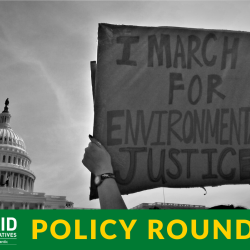This is the February edition of the GRID Mid-Atlantic Policy Roundup, keeping you up-to-date on renewable energy policy that promotes equity in the District of Columbia, Virginia, Maryland, and nationally.
It's been a quiet month on the policy front in DC, but there's been more than enough to make up for it in Virginia and Maryland, where state legislative sessions are in full swing. Fortunately, many of the bills that are still alive in Virginia are focused on not just clean energy, but making clean energy equitable. Maryland, too, has been active on the clean energy front.
Let's start with an update from Virginia:
VIRGINIA
The Virginia Clean Economy Act (VCEA) was passed by both the Virginia House of Delegates and Senate on Feb. 11, which means each chamber’s (slightly different) version of the bill will now cross over to be heard in the opposite chamber. The bill includes one of the most ambitious state-wide renewable portfolio standards (RPS) in the country, requiring Dominion Energy to source 100% of its energy from clean sources by 2045 and Appalachian Power Company to do the same by 2050.
VCEA has a strong focus on equitable clean energy access for historically disadvantaged communities, including such measures as:
- Requiring a percentage of each year’s RPS level to be met by distributed generation, with one quarter of that requirement to be met by low-income projects
- Authorizing power purchase agreements (PPAs) for low- to moderate-income customers and tax-exempt nonprofits of any size
- Raising the net metering cap on to 6%, with 1% reserved for low- to moderate-income communities
- Requiring 50% of revenues from any deficiency payments from utilities go to job training programs in historically economically disadvantaged communities, and 30% to renewable energy programs in those communities
- Requiring that utilities promote outreach to low- to moderate-income customers about solar
—
Solar Freedom, which also passed through the Virginia House and Senate, seeks to make customer-sited renewable energy — like rooftop solar — more accessible by removing caps on PPAs and net metering and eliminating standby charges.
—
A number of other bills focused on renewable energy and environmental justice were also passed in the first half of the session and will now go to the other chamber for review. Those bills included provisions that would:
- Require utilities to establish shared-solar programs that allow customers to purchase subscriptions in a solar facility (HB1634)
- Authorize the Department of Mines, Minerals and Energy to sponsor a statewide financing program for commercial solar (HB654)
- Center environmental justice in state government decision-making (HB704, HB1042, HB1162, HB1164, SB406)
—
In non-solar news, last month, Virginia became the 38th state to ratify the Equal Rights Amendment. The amendment missed the initial deadline needed in order to be added to the Constitution, though many in Congress are pushing legislation to remove the deadline.
—
MARYLAND
The legislative session in Maryland has also been active on the clean energy front. For example:
- HB1206 would direct a new Commission on Environmental Justice and Sustainable Communities to designate areas as disadvantaged communities and prioritize those areas for clean energy and energy efficiency investment. A hearing is scheduled for HB1206 in March.
- HB1549 seeks to bolster workforce development by creating a training pilot program in Baltimore to encourage young women and people of color to pursue green careers.
—
NATIONAL
The number of solar jobs in the U.S. increased 2.3% in 2019 after losses in 2017 and 2018, according to the National Solar Jobs Census released by The Solar Foundation. The number of national solar jobs has increased by 167% since 2010 and 44% since 2014.
More info on solar jobs from the report:
- The largest and fastest-growing sector of the solar workforce is in installation and project development (64.9%)
- Women make up 26% of the solar workforce
- 17% of the solar workforce is Latino/Hispanic, 9% is Asian, and 8% is Black/African-American
Solar continued to grow in most states within the Mid-Atlantic region. Solar jobs:
- increased by 15.4% in Virginia (the seventh-highest jump among states from 2018)
- increased by 7.5% in Maryland
- increased by 5.7% in Delaware
- decreased by 3.8% in DC (though DC ranks seventh in the nation in solar jobs per capita, including Puerto Rico)

